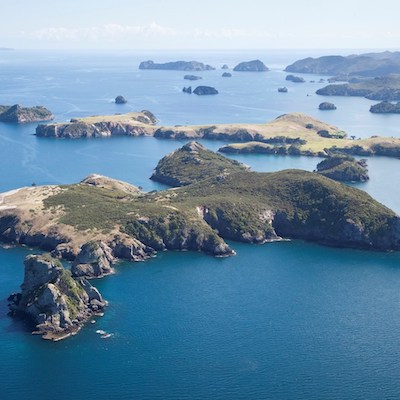
- which lasted for something like 20 million years. Today I was reading about the marine protection areas of the Hauraki Gulf which are shortly to be expanded under the 'Revitalising the Gulf' strategy announced by the ministers for Oceans and Fisheries, and Conservation respectively.
This latest move will see the fully protected area of the Gulf rise from 0.3% to just over 5%.
Sounds like a big enough increase - the Hauraki Gulf covers some 1.2 million hectares so the increase is from 3,600 Ha to 60,000Ha.
Then I looked at a map showing all the new protection areas and was immediately struck by how small 5% of an area looks when you look at all of it.
You could say the fully protected area will increase by over 1,600% if you wanted to sound impressive. It's a bit like cricket - all depends on which way you want to spin it. The other way of looking at it is to say that 95% of the Hauraki Gulf Marine Park will not be fully protected.
That doesn't sound so good.
Scientists and environmentalists are calling (and have been for some time) for at least 30% of the Gulf to be protected as 'no take' zones. This, they say, is a minimum requirement to put the severely depleted ecosystems of the Marine Park on the road to recovery.
Nationally, just 0.4% of New Zealand's marine and coastal area is in 'no-take' reserves. This is well short of the commitment made by New Zealand in 2011 to have 10% fully protected. According to PhD student Jacob Anderson there is no roadmap towards this target and "so far, there hasn't been anyone brave enough to take it on".
This could be said of a lot of scenarios playing out around the world today. Leaders who tackle environmental problems head on, and in any meaningful way, are going to fall foul, for various reasons, of large segments of the communities they are elected to serve. Must be tricky for them: "Do I do what I know, and science confirms, to be the right thing, risking political and public backlash and an almost certain drop in popularity, or do I take the easy route - give the majority what they want (rather than what society as a whole needs) and leave the tough moves to the next person?"
Most would agree that strong leadership is a good thing, as long as it leads in the right direction, but of course there are as many right directions as there are points on the compass - it depends on where one's priorities lie.
The government is coming in for a lot of flak at the moment, and I daresay that will continue. It will be interesting to see what democracy makes of it all when we, in New Zealand, are called upon to elect the next lot.